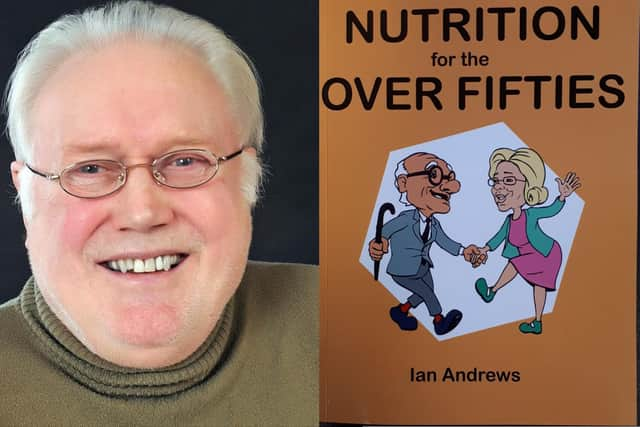Wellingborough author shares how vitamins in our diet could help in the fight against Covid
and live on Freeview channel 276
A Wellingborough author has shared his thoughts on how our diet could help in the fight against Covid.
This is the second of three articles by Ian Andrews MSc on how to keep your immune system healthy as the pandemic continues.
Advertisement
Hide AdAdvertisement
Hide AdIan spent several years doing research for Imperial College, Shell, Beechams and Surrey University before becoming a college lecturer.


His first book was about the traditional foods of his home county Northamptonshire, which went on to become his publisher’s best seller.
And 20 years later, he published his second book, Nutrition for the Over Fifties.
Here's what Ian has to say on our diets and how it could play a crucial part in protecting us from coronavirus.
Advertisement
Hide AdAdvertisement
Hide AdIan told the Northants Telegraph: "The immune system protects us against infection.
"It is up to us to keep ourselves healthy, even more so in these days of escalating coronavirus.
"There are two vitamins that the immune system uses, vitamin A and vitamin D.
"Liver is rich in vitamin A.
"It is so rich in vitamin A that we are advised to have no more than one helping of liver each week.
"Oily fish are another rich source of vitamin A.
Advertisement
Hide AdAdvertisement
Hide Ad"They can be recognised by having coloured flesh, for example, salmon, herring and sardines.
"White fish have white flesh which is low in vitamin A.
"It is suggested that we can have up to two portions of fish per week providing we have no more than one helping of oily fish.
"All other foods containing vitamin A have it in only small amounts.
"Common foods in this group are eggs, various dairy products such as butter and cheese, and some fortified low-fat spreads.
"They do not have sufficient vitamin A for a complete diet.
"This is where plants come to the rescue.
Advertisement
Hide AdAdvertisement
Hide Ad"Even though they do not contain vitamin A, they have something better.
"All green plants contain substances called carotenes.
"These can be converted to vitamin A in the liver.
"Our clever liver only converts carotenes to vitamin A when we need more of the vitamin.
"In that way we avoid having too much.
"Carotenes are present in green leaves.
"The darker green they are, the more carotenes they contain, for example spinach and kale.
"There are also carotenes in several fruits and vegetables, such as carrots, sweet potatoes, peppers and apricots.
"Vitamin A is fairly easy to get in the diet.
Advertisement
Hide AdAdvertisement
Hide Ad"This is not true for vitamin D. Around one in five adults in the UK are deficient for vitamin D, and it is higher for older adults.
"Vitamin D is found in a small range of foods, oily fish, liver, red meat and eggs.
"Vitamin D is virtually absent from plant foods.
"Vegetarians can benefit from having foods fortified with vitamin D, for example low fat spreads and some breakfast cereals.
"Another way to get vitamin D is by exposure to sunlight.
"This is only of real value from March to October.
"Exposing the skin to sunlight causes vitamin D to be produced in the skin.
Advertisement
Hide AdAdvertisement
Hide Ad"Exposing the arms and legs to sunlight for just ten minutes between 11am and 3pm will provide a day’s supply of vitamin D.
"The good thing about this is that when sufficient vitamin D has been produced the skin stops making any more.
"This precludes the build-up of an excess of vitamin D.
"The down-side of this system is that exposing the skin to sunlight does present a small risk of developing skin cancer.
"It is really only suitable for people who would normally be out of doors.
Advertisement
Hide AdAdvertisement
Hide Ad"Also, it has to be said that people with darker skin, or who use sun blocker will not benefit so much from this process.
"There is one more way to get vitamin D, whether it be summer or winter.
"This is to take a vitamin D supplement.
"If you do this the recommended maximum dose is 10mcg (400 IU) of vitamin D, per day.
"Consult your GP before taking any supplements.
"Older people absorb vitamin D less efficiently than younger adults and should consult their GP about their possible need for vitamin D supplements.
Advertisement
Hide AdAdvertisement
Hide Ad"This is especially important if they suspect they may have osteoporosis.
"Vitamins A and D are essential for your general good health as well for the health of your immune system.
"It is important to have sufficient of each but not to have too much."
In Ian's next article he will be talking about the impact lifestyle can have on our immune system.
Advertisement
Hide AdAdvertisement
Hide AdTo read Ian's previous piece on how to keep your immune system healthy, click here.
For more information about Ian and his books, click here.
Message from the editor:
Thank you for reading this story on our website. While I have your attention, I also have an important request to make of you.
In order for us to continue to provide trusted local news on this free-to-read site, I am asking you to also please purchase a copy of our newspaper.
Our journalists are highly trained and our content is independently regulated by IPSO to some of the highest standards in the world. The dramatic events of 2020 are having a major impact on many of our local valued advertisers and consequently the advertising that we receive.
We are now more reliant than ever on you helping us to provide you with news by buying a copy of our newspaper.
Thank you